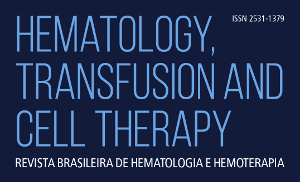Open Access
Hematology, Transfusion and Cell Therapy
Publicação de: Associação Brasileira de Hematologia, Hemoterapia e Terapia Celular (ABHH)
Área:
Ciências Da Saúde
Versão impressa ISSN:
2531-1379
Versão on-line ISSN: 2531-1387 Título anterior: Revista Brasileira de Hematologia e Hemoterapia
